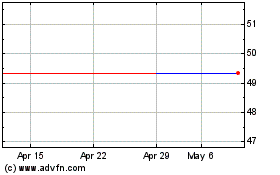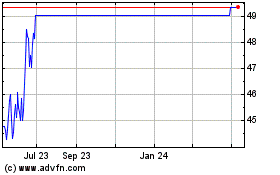Today's Top Supply Chain and Logistics News From WSJ
February 26 2018 - 7:18AM
Dow Jones News
By Paul Page
Sign up: With one click, get this newsletter delivered to your
inbox.
United Parcel Service Inc. is suing the European Union's
antitrust watchdog over the regulator's 2013 decision to block the
package carrier's acquisition of TNT Express. The $2.15 billion
suit revives the heated debate over consolidation in the global
parcel industry that culminated in FedEx's Corp's purchase of TNT
in 2016. The WSJ's WSJ's Natalia Drozdiak writes that deal only
happened after the European Commission formally blocked the UPS-TNT
deal three years earlier over concerns the
overnight-parcel-delivery market would effectively become a duopoly
between the combined company and DHL, a unit of Deutsche Post AG.
The European Union's second-highest court last year overturned the
decision on the basis of procedural missteps by the regulator. UPS
is now seeking compensation from the commission for a decision the
company says prevented it from "materializing the benefits
associated with that proposed transaction."
A dispute over a marine container terminal in East Africa
highlights growing international commercial and geopolitical
concerns in the region. The nation of Djibouti seized the port
facility run by DP World, and the WSJ's Nikhil Lohade and Matina
Stevis-Gridneff report the action marks a dramatic step in the tiny
country's moves to take stronger control of a strategically
important site where the Red Sea and Gulf of Aden meet. DP World,
which owns a third of the Doraleh Container Terminal, is fighting
the seizure, but some now expect Djibouti's government, which owns
the rest of the site, to strike a deal with Chinese investors.
China interests already have a foothold in the region: China
Merchant Holding Co. backed a $600 million Djibouti marine terminal
that opened last year. The tussle reflects the rising importance of
the Horn of Africa, which sits along busy seaborne trade lanes and
has gained greater significance as major powers seek strategic
outposts in the region.
Wool is the new hot commodity in apparel and supply chains are
struggling to catch up. A trend that kicked off when wool sneakers
from startup Allbirds Inc. became popular in Silicon Valley is
spreading, and big brands like Adidas and Under Armour are jumping
on board, raising global demand for merino wool, the fine product
named for a breed of sheep. The demand is also driving up prices
for the fiber, the WSJ's Lucy Craymer reports, while providing a
lesson in how sourcing operations built around agriculture and
natural materials can't easily turn supplies up and down to follow
annual trends. The sheep population in Australia and New Zealand,
the world's largest wool exporters, is near a 100-year low after
farmers shifted to dairy or higher-yielding crops after prices of
wool collapsed in the 1990s. One apparel maker says it may take
seven years of breeding to get sheep producing even on farms that
already produce the fine merino wool.
ECONOMY & TRADE
American mining companies are getting the lift they've long been
waiting for, but it's not coming from new U.S. demand. American
companies are shipping far more coal to Europe and Asia, bulking up
international supply lines and helping stop a yearslong decline in
the number of U.S. mining jobs. Exports of U.S. thermal coal used
by utilities more than doubled last year to 42 million tons last
year, the WSJ's Kris Maher reports, more than offsetting a steep
drop in coal used at U.S. power plants as U.S. energy business
moves toward natural gas. The export opportunities come from a
tightening of global supply, attractive pricing in Western Europe
and greater coal use in developing countries like India. The U.S.
Midwest looks to be benefitting the most as miners push volumes by
river barge to export sites on the Gulf of Mexico, while ports on
the East Coast are often congested and groups block coal export
upgrades on the West Coast.
QUOTABLE
IN OTHER NEWS
International trade flows rose 4.5% in 2017, the fastest pace
since 2011. (WSJ)
Mexico's economic growth slowed to 1.5% in the fourth quarter,
bringing full-year growth to 2%. (WSJ)
Analysts are stumped by the dollar's 11% slide in the past two
years against the currencies of major trading partners. (WSJ)
The market for used equipment including railcars, airplanes and
trucks is likely to heat up because of changes in U.S. tax law.
(WSJ)
The Trump administration levied new sanctions on North Korea
that included restrictions on nearly 60 shipping and trading
companies. (WSJ)
The chairman of Chinese car maker Zhejiang Geely Holding Group
Co. has accumulated a 9.7% stake in Germany's Daimler AG. (WSJ)
Businesses are reporting strong inflationary pressures even as
consumers see few price increases. (WSJ)
General Mills Inc. is jumping into the fast-growing natural pet
food market by buying Blue Buffalo Pet Products Inc. for $8
billion. (WSJ)
Semiconductor parts supplier Xcerra Corp. and a Chinese
state-backed group terminated their merger agreement, citing
difficulty in securing federal approval for the deal. (WSJ)
Auto-parts supplier Takata Corp. will pay a $650 million civil
penalty to end a probe by U.S. states into its actions surrounding
rupture-prone air bags. (WSJ)
KFC's epic U.K. supply chain woes in the U.K. appear centered on
DHL's decision to consolidate logistics operations into a single
new, untested distribution center. (Financial Times)
Shoe retailer Charlottee Olympia filed for chapter 11 bankruptcy
protection and will close all its U.S. stores. (Forbes)
Japan's Yamato Holdings Co. Ltd. is expanding in Southeast Asia,
starting a forwarding service for importers and exporters. (Nikkei
Asian Review)
General Electric Co.'s transportation unit signed a $1 billion
deal to supply 30 freight locomotives to Ukrainian Railways.
(Reuters)
Cargill Inc.'s head of shipping wants to see strong penalties
against vessel operators that sidestep new environmental rules.
(Lloyd's List)
Shippers of refrigerated goods are turning to intermodal rail
transport because of tight highway capacity. (Journal of
Commerce)
The cost of building an inland container handling station near
the South Carolina's Port of Charleston has soared 26% since the
project was announced 17 months ago. (Post and Courier)
Container shipping volume at the Port of Charleston tumbled 9.5%
in January. (American Shipper)
U.S. antitrust regulators want to halt Wilhelmsen Maritime
Services' acquisition of maritime supplier Drew Marine Group.
(Maritime Executive)
Chinese startup Tianjin Cargo Airlines will launch service with
three Boeing Co. 737 freighters. (Air Transport World)
ABOUT US
Paul Page is deputy editor of WSJ Logistics Report. Follow him
at @PaulPage, and follow the entire WSJ Logistics Report team:
@brianjbaskin , @jensmithWSJ and @EEPhillips_WSJ. Follow the WSJ
Logistics Report on Twitter at @WSJLogistics.
Write to Paul Page at paul.page@wsj.com
(END) Dow Jones Newswires
February 26, 2018 07:03 ET (12:03 GMT)
Copyright (c) 2018 Dow Jones & Company, Inc.
Deutsche Post (PK) (USOTC:DPSGY)
Historical Stock Chart
From Jun 2024 to Jul 2024

Deutsche Post (PK) (USOTC:DPSGY)
Historical Stock Chart
From Jul 2023 to Jul 2024
